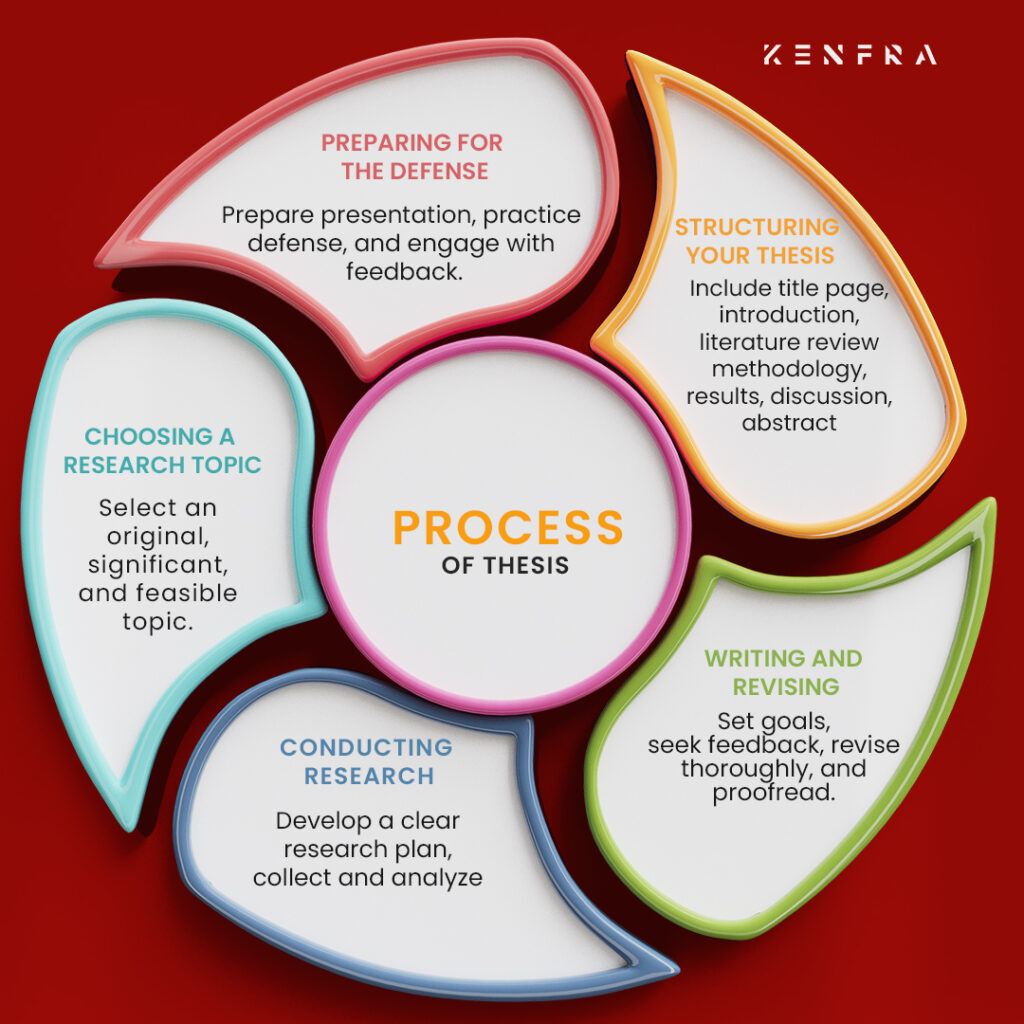Ultimate Guide to Writing a PhD Thesis: Steps, Tips, and Best Practices | Kenfra Research”
Kenfra2024-07-13T15:32:03+05:30What is the Process of Writing a PhD Thesis?
Embarking on the journey to write a PhD thesis can be both exhilarating and daunting. It represents the culmination of years of research, study, and hard work. Whether you are at the beginning of this journey or somewhere in the middle, understanding the process of writing a PhD thesis can help you stay organized and focused. This guide will walk you through the essential steps involved in writing a successful PhD thesis.
Steps involved in writing a successful PhD thesis
1.Choosing a Research Topic:
The first step in writing a PhD thesis is selecting a research topic. This topic should be original, significant, and feasible. Here’s how you can approach this crucial step:
Identify your interests:
Choose a subject that genuinely excites you. Passion for your topic will sustain your motivation over the long haul.
Literature review:
Conduct a comprehensive literature review to identify gaps in existing research. This will help you refine your topic and ensure its originality.
Consult with advisors:
Seek guidance from your academic advisors and mentors. Their expertise can help you narrow down your options and select a viable research question.
2.Conducting Research
Once you have a topic, the next step is to conduct thorough research. This phase is the backbone of your thesis and involves several key activities:
Designing your research: Develop a clear research plan, including your methodology, data collection methods, and analysis techniques.
Gathering data: Collect data through experiments, surveys, fieldwork, or archival research, depending on your field of study.
Analyzing data: Use appropriate statistical or qualitative analysis methods to interpret your data. Make sure your analysis aligns with your research questions and objectives.
3.Structuring Your Thesis
A well-structured thesis is essential for clarity and coherence. Typically, a PhD thesis includes the following sections:
- Title page: Includes the title of your thesis, your name, department, and the date of submission.
- Abstract: A concise summary of your research, including your research question, methods, results, and conclusions.
- Introduction: Introduces your research topic, provides background information, and states your research question or hypothesis.
- Literature Review: Reviews existing research relevant to your topic, identifying gaps that your study aims to fill.
- Methodology: Describes the methods you used to conduct your research, including data collection and analysis.
- Results: Presents the findings of your research, using tables, figures, and text.
- Discussion: Interprets your results, discussing their implications and how they relate to existing research.
- Conclusion: Summarizes your findings, highlights their significance, and suggests areas for future research.
- References: Lists all the sources you cited in your thesis.
- Appendices: Includes supplementary material such as raw data, detailed calculations, and additional graphs or charts.
Writing and Revising
Writing your thesis involves drafting and revising each section multiple times. Here are some tips for this phase:
- Set goals: Break down the writing process into manageable tasks and set deadlines for each section.
- Seek feedback: Regularly share drafts with your advisors and peers to get constructive feedback.
- Revise thoroughly: Pay attention to clarity, coherence, and consistency. Ensure your arguments are well-supported by evidence.
- Proofread: Carefully check for grammatical errors, typos, and formatting issues.
Preparing for the Defense
After completing your thesis, you must defend it before a committee of experts. This process involves:
- Preparing your presentation: Create a clear and concise presentation summarizing your research, findings, and conclusions.
- Practicing your defense: Rehearse your presentation multiple times and anticipate possible questions from the committee.
- Engaging with feedback: Be prepared to discuss and defend your work, demonstrating a deep understanding of your research topic.
Conclusion
Writing a PhD thesis is a complex and demanding process, but with careful planning and perseverance, it is achievable. By following these steps—choosing a research topic, conducting thorough research, structuring your thesis, writing and revising, and preparing for the defense—you can successfully complete your PhD thesis. Remember, the journey is as important as the destination, and each step you take brings you closer to your goal.
For more insights and guidance on academic research, stay tuned to Kenfra Research. Happy writing!








Leave a Reply